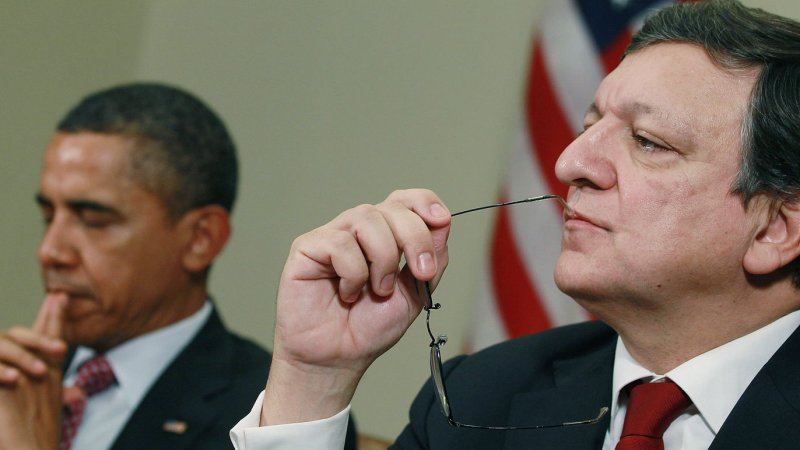European Commission President Jose Manuel Barroso (R), with U.S. President Barack Obama (L) in 2011, has said he wants to invest in infrastructure projects to support European growth. UPI/Mark Wilson/Pool |
License Photo
BRUSSELS, July 11 (UPI) -- The pilot phase of an EU bond initiative to boost funding for energy and other infrastructure projects was approved by ministers this week.
The Council of Europe said Tuesday it had adopted a regulation launching the 2012-2013 pilot phase of the Europe 2020 Project Bond Initiative, set up to augment private funding for energy, transportation and broadband technology projects that otherwise might not get built.
The bonds are aimed at leveraging $5.5 billion in private infrastructure investments at a time when government budgets have been slashed and European leaders have agreed to a $147 billion growth pact to help fight high unemployment.
The bonds consist of debt issued by private companies to finance a specific project, with credit enhancement provided by the EU instruments to make it easier for the companies to attract private financing.
The European Investment Bank will take up subordinated debt positions in the projects, while funds from the EU budget will be used to cover part of the EIB's risk.
The decision to implement the pilot phase was approved Tuesday by the EU's Economic and Financial Affairs Council, the group said in a statement. If it is successful, it will be followed by a 2014-2020 operational phase as part of the EU's $69 billion "Connecting Europe" facility, the statement said.
The move came a week after European Parliament lawmakers overwhelmingly endorsed the launching of the pilot phase in a plenary session vote.
"Budgetary stability policies will only bear fruit if they are accompanied by stimuli measures based on a smart use of available resources," Member of European Parliament Dominique Riquet of the EPP Group said Thursday.
"Project bonds are a perfect example of such policies, as they will apply to sectors with high employment and competitiveness potential such as transport, energy, and broadband," he said.
The Council said the project bonds will cover up to $240 million in 2012-2013 for transportation projects, up to $12.3 million for energy and up to $24.5 million for information technology and broadband projects.
They will not create any additional drains on the EU budget because they will be financed through the use of existing budgetary lines of up to $281 million.
"This input of private capital is more than necessary because the sovereign debt crisis is making available public money more scarce," Riquet said. "This is maybe the beginning of a mixed financial economy as a solution to the crisis."
The project bonds, he stressed, are not like eurobonds, which are collectivized sovereign debt, but are actually private debt issued to "support sustainable projects which only need a European boost."
The Connecting Europe fund would be used to encourage investors from the private and public sectors to help finance such projects, some of which would otherwise not be built, and would also help achieve the EU's growth and jobs goals contained in its Europe 2020 strategy.
The EU is "making a down payment for Europe's future growth and jobs" through the infrastructure investments, as well funding for cross-border transport links and high-speed digital networks, European Commission President Jose Manuel Barroso said last October.
Planners, he added, have "identified 11 energy corridors that cover all parts of the EU" that will receive priority consideration for new project funding, including efforts related to a new "southern corridor" natural gas pipeline and offshore wind farms in the North Sea.















